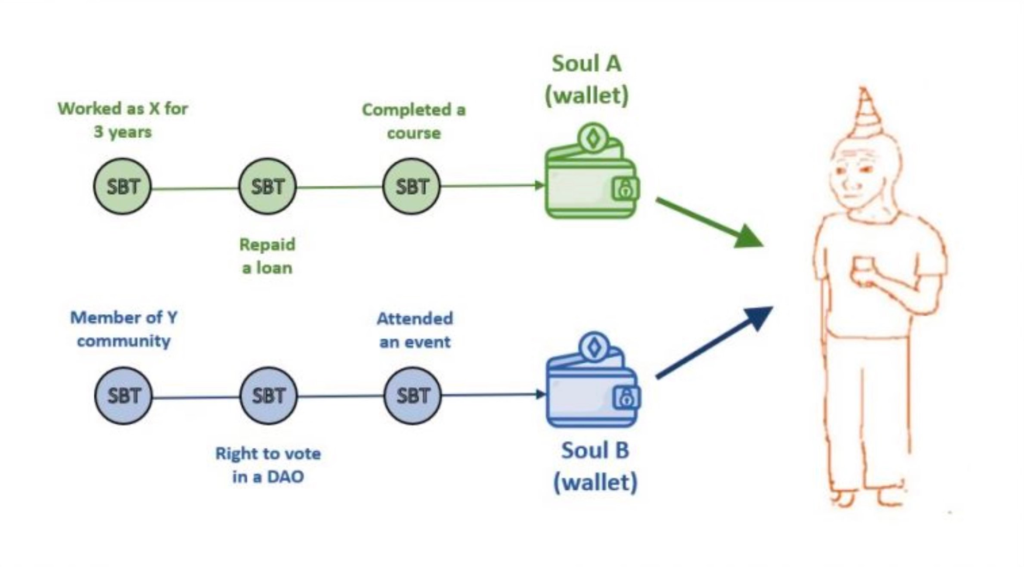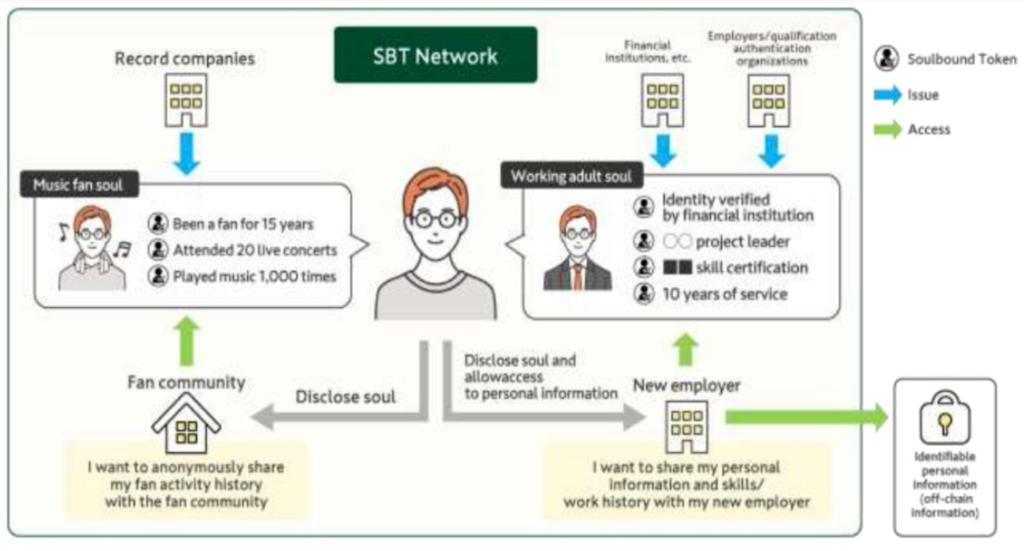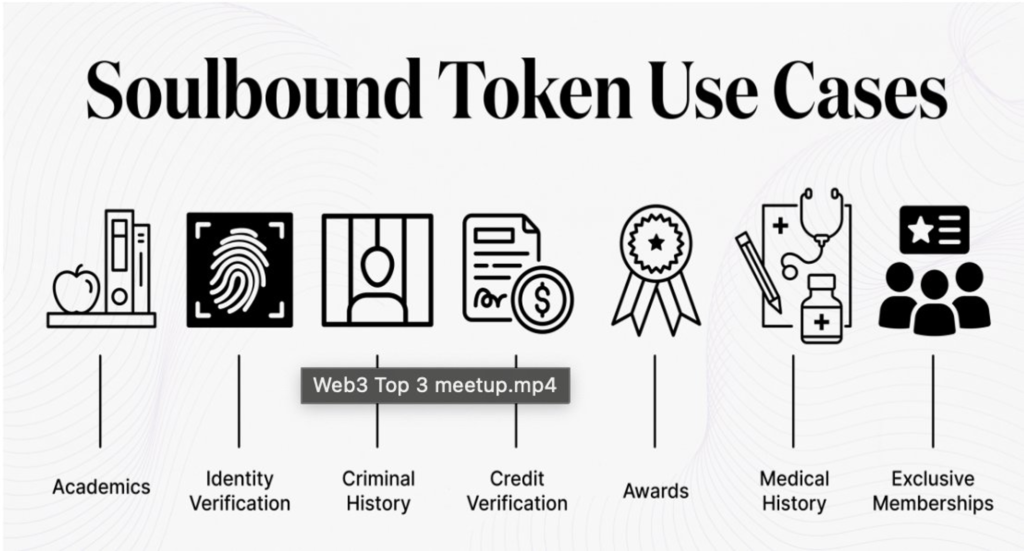Understanding Soulbound Tokens (SBTs): The Digital Identity Tokens

In both social media and professional environments, combating fake identities and misinformation is an ever-growing challenge. The absence of accreditation and employment record verification creates difficulties in establishing the authenticity of individuals’ information. However, there’s a groundbreaking solution known as Soulbound Tokens (SBTs), revolutionizing the concept of digital identity. Curious to learn what SBTs are and how it tackles these issues? Uncover the details in this article.
Article Summary
- 🪙 Soulbound Tokens (SBT) are non-transferable digital identity tokens stored on the blockchain. It represents the reputation and achievements of an individual or entity, including work history, medical records, accreditations, and accomplishments.
- 🖼️ SBTs are designed not to be transferable or tradable once issued to the user’s wallet, so they remain linked to their original owner forever. They are different from conventional NFTs that can be transferred ownership.
- 📄 Vitalik Buterin and his colleagues introduced the concept of SBTs through the whitepaper titled “Decentralized Society: Finding Web3’s Soul.”
- 📟 SBTs can serve as a “digital passport” that proves identity without directly revealing personal information.
What are Soulbound Token (SBTs)?

Soulbound tokens are non-transferable digital identity tokens stored on the blockchain. The identity can represent a user’s work history, medical records, accreditations, and achievements.
Since SBTs cannot be transferred from one wallet to another, they are permanently ‘bound’ to a unique wallet. The wallet is compared to a ‘Soul’, thus called ‘Soulbound’.
You can have several Souls or wallets that contain Soulbound Tokens (SBTs), such as Educational Soul, Medical Soul, or Work Experience Soul. For example, in Educational Soul, you can collect SBTs that showcase your educational institutions.
The concept of SBTs was introduced by Ethereum founder Vitalik Buterin, and his colleagues, Puja Ohlhaver and Erin Glen Weyl. In May 2022, they launched the SBT whitepaper titled Decentralized Society: Finding Web3’s Soul.
The whitepaper describes a decentralized society (SocDec) and how it can be realized through SBTs.
SBTs can act as a "digital passport" that users can use across various platforms and applications without needing to provide personal information directly. Users can prove their identity through SBTs.
What are the Differences between NFTs and SBTs?
Unlike conventional NFTs, where they are possible to buy, sell and transfer ownership, SBTs are created to be permanently stored in the wallets of the original creator or recipient.
For example, a university issues an Educational Soul consisting of SBT to its students. The token will store in the student’s wallet to give them identity and cannot be transferred.
Thus, unlike NFTs that have value based on supply and demand, SBTs have no monetary value and cannot be traded once issued to the user’s wallet.
In addition, there is a notable difference between the two. Conventional NFTs represent ownership of valuable digital assets and properties, while SBTs represent the reputation and achievements of an individual or entity.
Can I buy Soulbound Tokens (SBTs)? SBTs are not tradable and have no monetary value. Instead, individuals or entities can issue them as a representation of accomplishments.
Read also What is NFT?
How Do Soulbound Tokens (SBTs) Work?

The Soulbound Tokens (SBTs) are created on a special design that ensures the tokens are permanently tied to its owner. Here is how SBT works:
- Token Creation: SBT is first created or minted by an authorized entity, such as a community, institution, or platform. This process involves smart contracts that run on top of the blockchain.
- Token Distribution to the Initial Owner: Once an SBT is created, it is first given to its initial owner. The initial owner can be the creator of the token itself or any other individual eligible to receive it.
- Non-Transferable Property: SBTs show a fundamental difference from conventional NFTs. Their design ensures they are non-transferable or tradable once issued to the user’s wallet. It means that once an SBT is given to its initial owner, the token remains stored in the same wallet and cannot be transferred to another wallet.
- Permanent Ownership: The ownership of SBT is permanent and cannot be changed. An SBT is linked to its original owner. It creates a strong emotional and personal connection between the owner and the token.
Use Cases of Soulbound Token (SBT)

In the Web3 ecosystem, reputation and digital identity are becoming more important. Certain SBTs can also prove the ability of individuals or organizations to pay loans in DeFi from financial institutions, such as Masa Finance.
By having SBTs that reflect credit records and the ability to pay loans on time, individuals or organizations can increase their credibility to get loan funds to interact with the DeFi platform.
In addition, Soulbound Tokens also have the potential to be the most secure and easy way to create a valid CV or resume of a person based on work experience.
With SBTs, resumes can be more trusted because every qualification and achievement listed on tokens are verified on the blockchain.
Furthermore, SBTs can also be an alternative for voting in a decentralized autonomous organization (DAO). Unlike the current governance model based on the number of tokens members hold, SBTs can assign voting power based on user interaction and community reputation. The model can help prevent malicious attacks, such as the Sybil attack.
A Sybil attack is a tactic where an entity or individual attempts to buy a large portion of governance tokens to control the project's direction.
Read also: Get to Know the Decentralized Autonomous Organization (DAO), How It Works and Its Implementation.
Examples of Soulbound Tokens (SBTs)
Although the public and the NFT ecosystem have yet to thoroughly implement the Soulbound Tokens (SBTs), some parties have tried implementing them in the real world.
For example, MoonPay has launched Web3 Passport in the form of SBT, a loyalty and rewards program that provides exclusive access to products and experiences from MoonPay partners.
Besides MoonPay, several parties have also shown interest in SBTs, such as the Ternoa blockchain project, VC LongHash, and the collaboration of MetaMask, Cobo, and Gnosis Safe.
SBT’s implementation also expanded with the National University of Mongolia’s diploma tokenization. Besides, Sumitomo Mitsui Banking Corporation (SMBC) conducted a successful SBT trial, demonstrating the potential value and benefits of SBTs.
The Future of Soulbound Tokens (SBTs)
Based on its whitepaper, SBTs are expected to be one of the foundations for a decentralized society (SocDec) in the Web3 era. Soulbound Tokens can help solve trust issues by establishing provenance and reputation, and also reduce the risk of manipulation and fraud in the Web3 ecosystem.
Despite the challenges related to privacy and decentralization, SBTs hold significant potential to address diverse digital reputation and trust concerns among parties in the evolving internet.
References
- E. Glen Weyl, Puja Ohlhaver dan Vitalik Buterin, Decentralized Society: Finding Web3’s Soul, Soulboun Token Whitepaper, accessed 1 Agustus 2023.
- Andrey Sergeenkov, What Are Soulbound Tokens? The Non-Transferrable NFT Explained, Coindesk, accessed 1 Agustus 2023.
- Jex Exmundo, NFTs 2.0: How Soulbound Tokens Could Change Society as We Know It, NFT Now, accessed 1 Agustus 2023.
- Bankless Publishing, A Primer on Soulbound Tokens, Bankless, accessed 1 Agustus 2023.
Share


